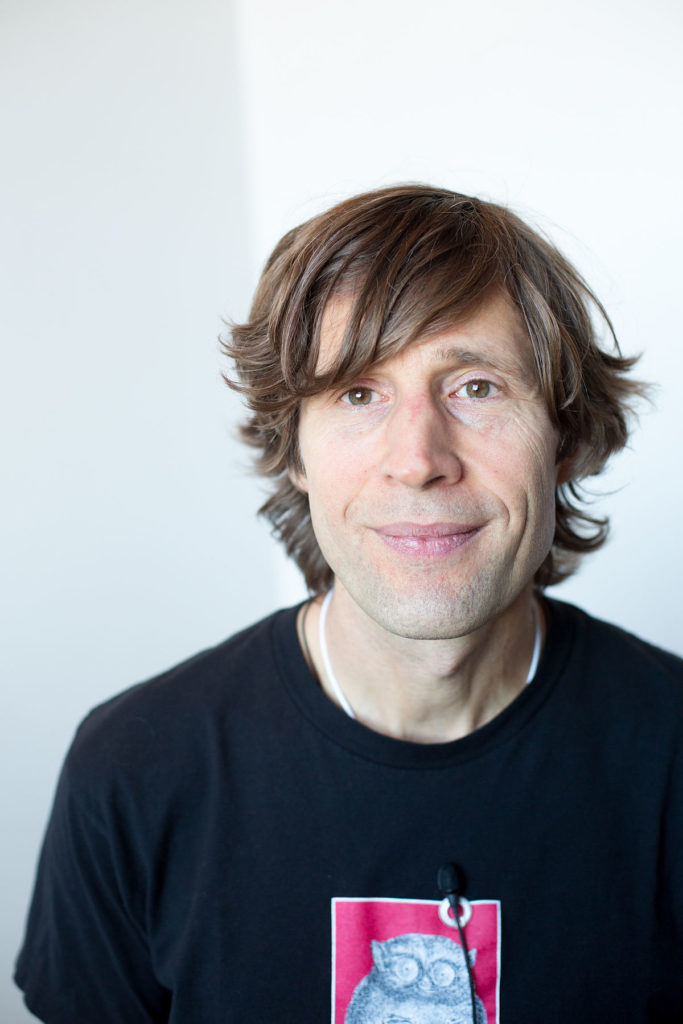Best Rodney Mullen Quotes : The insight and experience of others is a valuable source of inspiration and motivation. And learning from successful leaders and entrepreneurs is a fantastic way to grow, and today we are interested in the best quotations and proverbs said and written by the famous Skateboarder Rodney Mullen.
Even if one cannot sum up the life of Rodney Mullen with famous quotes and phrases, some motivational quotes, inspiration and life proverbs should be known, not only to fans, but also to the general culture.
So in this post, we offer you a handpicked selection of the best +18 Rodney Mullen quotes, with text and images to motivate and encourage you to achieve your goals and to help you stay focused throughout the day!
Short biography : Who is Rodney Mullen ?
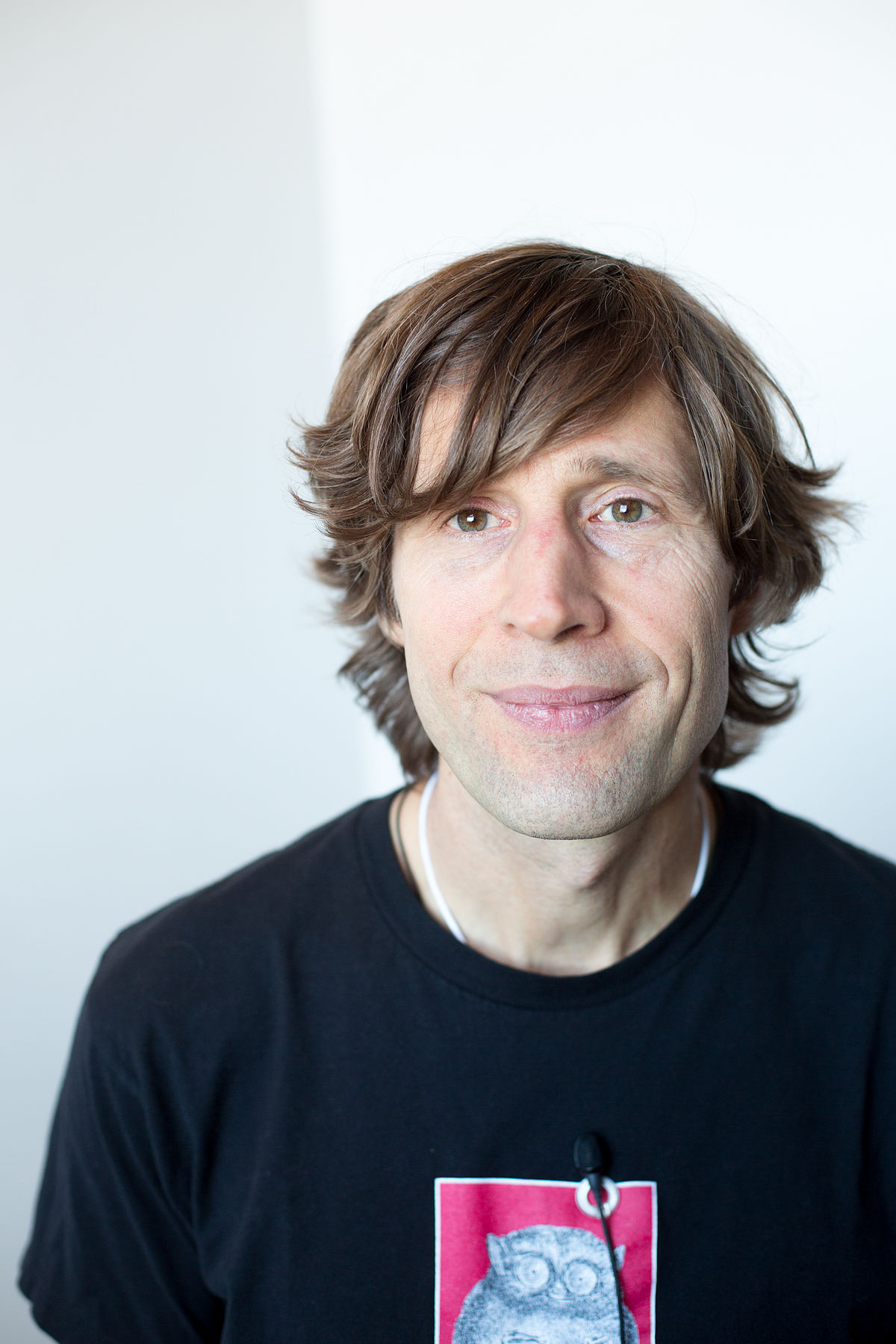
John Rodney Mullen[2][3] (born August 17, 1966[4]) is an American professional skateboarder, entrepreneur, inventor, and public speaker who practices freestyle skateboarding and street skateboarding.[5] He is widely considered the most influential street skater in the history of the sport, being credited for inventing numerous tricks, including the flatground ollie, kickflip, heelflip, impossible, and 360-flip. As a result, he has been called the “Godfather of Street Skateboarding.”[6]
- Rodney Mullen
- Skateboarder
- Birth place : Gainesville, FL
Mullen was born in Gainesville, Florida, United States, and began skateboarding at the age of ten, on New Years Day of 1977, after a neighborhood friend introduced him to a skateboard. He promised his strict father, a dentist, that he would cease skateboarding the first time he became seriously injured:
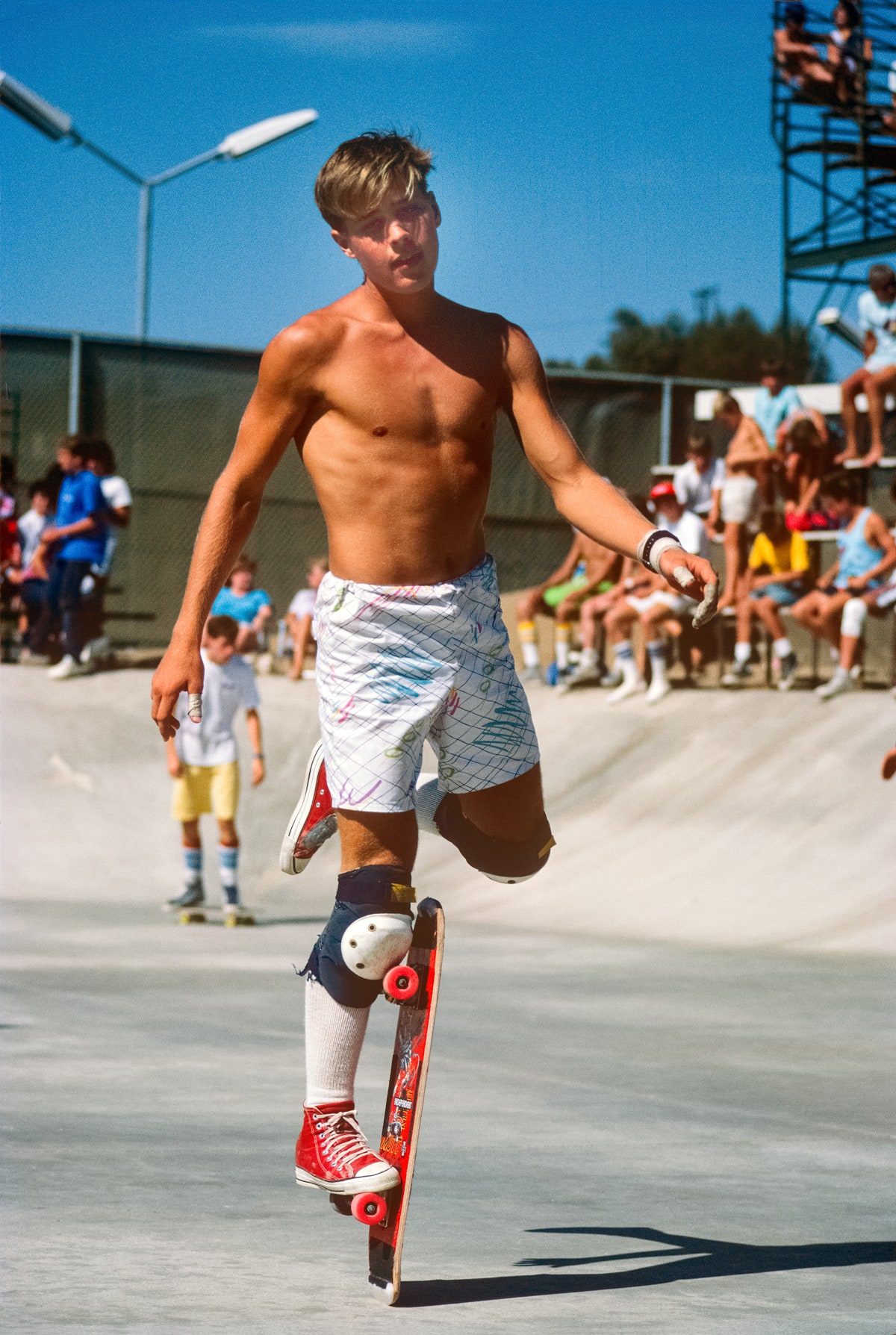

In 1978, even though he had owned a skateboard for only just over a year, Mullen placed fifth in the Boy’s Freestyle category at the US Open Championships at Kona Skatepark in Jacksonville, Florida. Skateboard manufacturer Bruce Walker saw his performance and sponsored Mullen through Walker Skateboards from 1978 to 1980. Mullen’s biggest influence in skateboarding at the time was a Walker professional skateboarder, Jim McCall, who was coached in his early years by Walker (Walker also coached a young Kelly Slater). Mullen was also influenced in a positive manner by professional skateboarders from Florida including Ed Womble, George McClellan, Clyde Rodgers, Tim Scroggs, and Kelly Lynn.
Rodney Mullen, 1988. “Innovation rarely comes by revolution; it develops by continual and gradual evolution.”
In later years, Mullen was coached by Barry Zaritsky (also known as “SIO Barry”), who owned a company called SiO Safety Shorts. When his family moved to a farm in a remote part of Florida, Mullen began perfecting his flatground techniques in the family garage; he has said that the isolation and lack of terrain naturally guided him towards freestyle skateboarding. Mullen cites July 1979–August 1980 as his “most creative time,” a time when he was predominantly a loner who counted the cows of the family farm as his best friends. Mullen then proceeded to win thirty successive amateur competitive victories in the late 1970s, mostly in his home state of Florida, culminating in a win at the Oceanside Nationals in June 1979.
In 1980, the 14-year-old Mullen entered the Oasis Pro competition, defeating the world champion, Steve Rocco. At Oasis Skatepark Mullen also spotted a 12-year-old skater who “introduced himself as Tony Hawk.” Recalled Mullen, “Before Tony was sponsored, before anybody knew anything about him, he made an impression on me,” and the two would go on to become good friends. Shortly thereafter Mullen turned professional as a member of the renowned Bones Brigade team sponsored by Powell Peralta, based on the recommendation by Powell Peralta rider and fellow Floridian skateboarder Tim Scroggs of Mullen to company co-founder Stacy Peralta, whom Mullen highly admired. Mullen competed voraciously throughout the 1980s, often frustrating competitors and judges with his consistency and progressive ability. By 1990, Mullen had won thirty-four out of thirty-five freestyle competitions that he had entered, losing only once to fellow Bones Brigade member, Per Welinder.
Invention of the flatground ollie Edit
Among his most significant contributions to the evolution of modern skateboarding, Rodney Mullen adapted the ollie, first pioneered by Alan Gelfand on vert (where Gelfand would scoop off the back trucks to obtain more air off the wall, but without popping the tail of the skateboard in the process), to flatground. This ability to pop the board off of the ground and drag it upward into the air, gaining significant altitude and air time, allowed ollieing onto rails and obstacles and opened the door to more complex flip tricks and other flatground tricks. The invention of this trick alone, even apart from the numerous other tricks that he has invented and his design work, has ranked Mullen as one of the most important skateboarders of all time. In response to the praise that he has received for the flatground ollie, Mullen stated in August 2012:
The origins of ollies—a guy named Alan Gelfand did it on vert… I had for a long time done a really simple movement, which was—it was just a transfer trick… and there are a ton of tricks where I needed to get to this side . It’s a transfer trick—I’d been doing that since the late seventies, so that I could, in turn, do things like this . When I saw him do it on the wall, I immediately—I’m thinking, the mechanics of it: how do you get your board off the ground—how would you get your board off the ground like he did off the wall, ’cause I’m stuck on flat ground, not weightless… he first ones I did took about, I don’t know, five, ten minutes… I realized, that’s just the same motion I’ve been doing for years—it’s a see-saw motion; that’s how ollies work… It’s just a punch and a little hop; and the real key to it was dragging your foot and leveling it out, which brings the board up… In a back-handed way, people credit me with—in the documentary, Stacy ’s Bones Brigade documentary, credit me with the importance of the ollie that gave the foundation for street skating, which is just skateboarding today, all that; and to me it was like, “Yeah, but, it’s not a big deal.” Took me ten minutes, fifteen, half an hour, an hour; and the next thing you know, you’re getting ’em this high, and that’s what laid the foundation for everything else. So, in a sense, the biggest innovation for street skating, which is what they credit me for—it’s not a big deal!
Throughout the 1980s, he invented the majority of skating’s ollie and flip tricks, including the flatground ollie, the kickflip, the heelflip, the 360-flip, and many others. These tricks are now considered an essential building blocks of both modern vert skateboarding and street skateboarding.
World Industries Edit
In early 1989, Mullen left the Bones Brigade to join World Industries as a principal investor with longtime friend and former rival, Rocco, in the formation of the very first skateboarder-owned company—professional skateboarder, Mike Vallely, later joined the company for a brief period of time. Mullen and Rocco had embarked on a very risky venture, as Powell Peralta was an established company and Rocco’s upstart company had been struggling at the time. World Industries would later develop into the distribution company, Dwindle Distribution, which is the world’s largest skateboard manufacturer in the 21st century.
Transition to street and Plan B Edit
As the popularity of freestyle skateboarding declined, Mullen was urged to transform his style to join the street skating trend that was becoming increasingly popular at that time; however, Mullen was very reluctant due to a fear of compromising his integrity, whereby the foundation of his skateboarding would be “sold out”. Such pressure is alluded to in the World Industries video, Rubbish Heap, in which Mullen’s sequence ends with team member, Jeremy Klein, deliberately breaking his freestyle skateboard (which is also the first recorded focus of a skateboard) and then handing him a note from Rocco, accompanied by a street skateboard deck, in which the end of freestyle is declared.
In 1991, Mullen joined the high-profile skateboarding team, Plan B Skateboards. Mike Ternasky, the owner of Plan B, influenced Mullen to transition from freestyle to street skating, and showcased his skills in the 1992 Plan B video, Questionable. His segment begins with traditional freestyle tricks executed on flat ground, but quickly transitions into Mullen skateboarding across public terrain to shift into street skating tricks and lines. Mullen’s video part signified a major transformation in relation to both his career and his skateboarding. Ternasky filmed Mullen as he sequenced tricks and mixed flip tricks with grinds and boardslides, while he also negotiated obstacles. Mullen also introduced two newly invented tricks in Questionable, the kickflip underflip and the Casper slide.
Mullen’s Questionable performance might have marked the beginning of a new era in street skateboarding. His reluctant transition from freestyle to street skateboarding was a symbol that legitimized the technical direction street skating had taken over the previous few years. Mullen focused on the progression of this transition in subsequent Plan B videos, including 1993’s Virtual Reality, in which Mullen showcases the newly mastered trick, the darkslide. Mullen’s participation in Plan B dissolved after Ternasky was killed in a car crash on May 17, 1994. Mullen later explained, “He was such a great person. He would lift you so high and that is why Plan B was what it was. And it was clear once Mike was gone that it was never the same.”
A-Team and Rodney vs. Daewon Edit
In 1997 Rodney Mullen started another company, the A-Team, along with Marc Johnson, Gershon Mosley, Dave Mayhew, and Chet Thomas, with the intention of forming a “super team” following the gradual dissolution of Plan B over the four years following Ternasky’s death. It was at this time that Mullen also initiated discussions with friend and fellow professional skateboarder, Daewon Song, to plan the video Rodney vs. Daewon, released in 1997, which featured the two skaters “competing” with their respective video parts (the concept developed into a series and, as of December 2012, three “rounds” have been produced).
Enjoi and Tensor Trucks Edit
The A-Team folded in 2000, and Mullen made the transition from company founder to company rider, as former Maple rider, Marc Johnson, founded Enjoi Skateboards (other riders included Chris Cole and Bobby Puleo, with Jerry Hsu and Louie Barletta, the current mainstays of the team, recruited later).
Around the turn of the 21st century, Mullen had been engaged in the development of his own skateboard truck design, a concept that would later become the foundation for the company, Tensor. In 2000, Mullen filed for a United States patent in support of his innovative work in the area and submitted the following abstract to the U.S. Patent and Trademark Office:
A skateboard having one or more truck assemblies configured to eliminate undesired ride characteristics such as hanger-jiggle and wheel bite, without sacrificing the skateboard’s steering responsiveness. Each truck assembly includes an axle assembly with a ring-shaped hanger that is confined on a kingpin using a pair of bushings, at least one of which includes an annular flange that projects into an annular gap defined between the hanger and the kingpin. This prevents the hanger from moving laterally relative to the kingpin and thereby eliminates undesired ride characteristics such as hanger-jiggle and wheel bite. In a separate feature of the invention, the skateboard truck assembly further incorporates a low-friction slider plate that enhances the rider’s performance of certain maneuvers and at the same time protects other components of the truck assembly from undue wear.
A subsequent advertisement was released, entitled “The Patented Tensor Design,” and the company recruited team riders such as Daewon Song, Chris Cole, Chris Haslam, Salman Agah, Ryan Sheckler, Kanten Russell, and Gailea Momolu. As of December 2012, the Tensor team consists of Daewon Song, Rodney Mullen, Ronnie Creager, Enrique Lorenzo, Manny Santiago, Zered Bassett, Felipe Ortiz, and Joey Brezinski.
Almost and Dwindle Distribution Edit
“The biggest obstacle to creativity is breaking through the barrier of disbelief.”
—Rodney Mullen
Mullen subsequently left Enjoi to co-found Almost Skateboards with Song, who had been unable to find success with the two preceding deck companies that he had founded, Deca and Artefact. Mullen and Song proceeded to recruit Cooper Wilt (a former Artefact rider), Chris Haslam (a former Deca and Artefact rider), Greg Lutzka, and Ryan Scheckler to form the initial basis of the company.
After years of success and controversy, Steve Rocco decided to sell World Industries. In 2002, World Industries, under the holding name “Kubic Marketing,” was sold to Globe International for US$46 million. Rocco, as the owner, and Mullen, as a principal investor, became instant multimillionaires. Kubic’s management remained intact, and Mullen began working for Globe under the Dwindle Distribution brand.
In 2003, Mullen wrote and released his autobiography entitled The Mutt: How to Skateboard and Not Kill Yourself. In late 2003, he was voted as the all-time greatest action sports athlete on the Extreme Sports Channel’s Legends of the Extreme countdown.
Mullen’s popularity also grew in this period when, in 2000, he made his first appearance in the Tony Hawk’s video game series which helped to bring the sport further into the mainstream.
As of December 2012, Mullen remains the co-owner and a team rider for the Almost brand; his role at Almost also includes research and development on new designs and technologies, including Impact Support, Double Impact, and Uber Light. The Uber Light design was a collaborative effort between Mullen and the CL Composites company, utilizing a design that consists of “a deck inside a deck,” whereby, “The internal carbon fiber foam deck is ultra light and nearly as stiff as metal. It acts like rebar, or a skeleton embodied by a standard 7-ply layup. It also vastly improved the lateral rigidity. The deck wears, slides, and looks like a normal 7-ply, but it’s lighter and has a supernatural pop that lasts far longer than any normal deck.”
Mullen also contributes to the design of experimental and composite deck constructions for Dwindle’s other brands, such as Blind and Darkstar.
Stance erasure Edit
As a result of injuries accrued over many years riding in a fixed regular stance, from 2007 onward Mullen made a conscious effort to “erase” his riding stance, re-learning tricks (and in many cases learning new tricks he was unable to do previously riding regular) goofy and endeavoring to re-learn riding a skateboard neutrally in the absence of any preferential “natural stance.” In an interview with Tony Hawk, Mullen explained that he had developed problems in his right hip joint, with scar tissue having built up in his joint over years as a result of habitually hyper-extending his leg (e. g., doing the splits, a danger inherent in practicing riskier tricks such as darkslides) while skating. Mullen stated that through extensive stretching and the use of blunt objects he was able to break up the scar tissue in order to restore range of motion.
Mullen further explained in an interview at Germany’s Bright tradeshow in 2011:
… for me, it was a grinding to a halt, until I could barely walk really, and, so I just set up myself into … I took about a couple of years, a year-and-a-half of breaking myself apart; pretty medievally. And as I did so, I realized that that was helping me unravel my stance; and so now, I’ve just been investigating, or pushing myself to try to, to, take apart my stance so that I no longer have one. And so it’s not just doing everything switch, because everybody does whatever switch. It’s to have no stance at a physical level. And so even what you did in your regular, native stance, it feels … ah … new.
In December 2010, Mullen stated in an interview that he was preparing to film a part for the upcoming Almost video, although he did not appear in the 2012 video, 5-Incher. In the 2011 Bright tradeshow interview, Mullen stated, “At first, I just wanted to be able to be alright and walk okay and run. And then it was like, okay, skate again and now it’s like ‘Yeah, I can do something new!’. So, if I can do that, then I’ll film. If I can’t, then I’ll keep my skating private.” Both the skateboard media and in responses from Almost indicate that a full part from Mullen is scheduled for release following 5-Incher—Mullen was in attendance at the premiere of 5-Incher. The most recent official video footage from Mullen can be seen in the 2007 United By Fate series that was produced by the Globe shoe company.
Mullen has publicly stated that an identification of his favorite skateboarders is an “endless” task. However, he has provided examples such as Chris Haslam, Bryan Herman, Paul Rodriguez, Antwuan Dixon, and Eric Koston.
2014–present Edit
The Almost company celebrated its 10th anniversary with an event at the Berrics indoor skate complex in early March 2014, and Mullen attended the venue for the first time. As part of the celebration, Mullen completed an interview with the Berrics that is titled “A Beautiful Mind,” in which Mullen explained his current relationship with skateboarding:
Because we all have that fear of judgment … yeah, that’s true. I’m like that—I’m afraid of being judged. I don’t necessarily want to be seen in public sucking, getting older; but, what I keep inside, that joy of feeling what I do, rolling around, playing around—that’s something I’m going to do as long as I can. That’s who I am … who I am.
The first video footage of Mullen skateboarding in nine years was published on Tony Hawk’s RIDE YouTube channel in July 2014. Mullen appears in the video skateboarding at musician Ben Harper’s residence and Harper also performs a single trick at the video’s conclusion. The part was filmed by Ben Fordham of the Gracias L.A. brand, which released the Gracias Skateboarding Volumen Uno video in 2014 that also features Mullen.
Together with other members of the Almost team, Mullen appeared in a June 2015 photo retrospective of the Almost brand that was shot and curated by skateboard photographer Seu Trinh. Mullen was part of the Globe brand’s “EUTrippin'” 2015 European tour, alongside other team members including Mark Appleyard and Haslam.
In 2015, Mullen wrote the foreword for the Dwindle and Globe history book Unemployable: 30 Years of Hardcore, Skate and Street reflecting upon his twenty-year involvement with those companies.
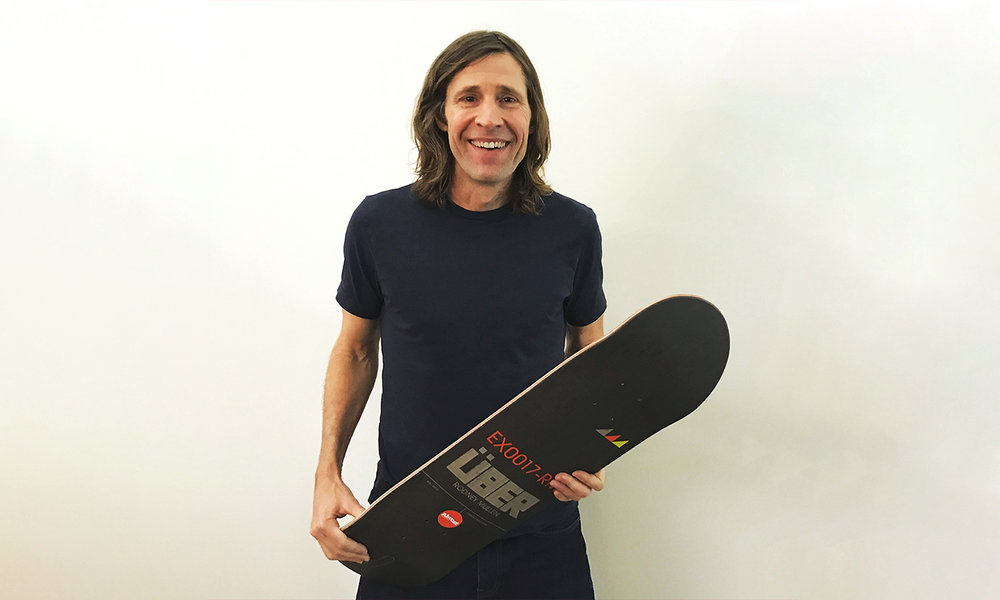
+18 Best Rodney Mullen Quotes, inspiration and Motivation with photos (2020)
I’ve been all around the world, and there will be a thousand kids crying out your name, and it’s such a weird, visceral experience. It’s like, it’s disorienting.
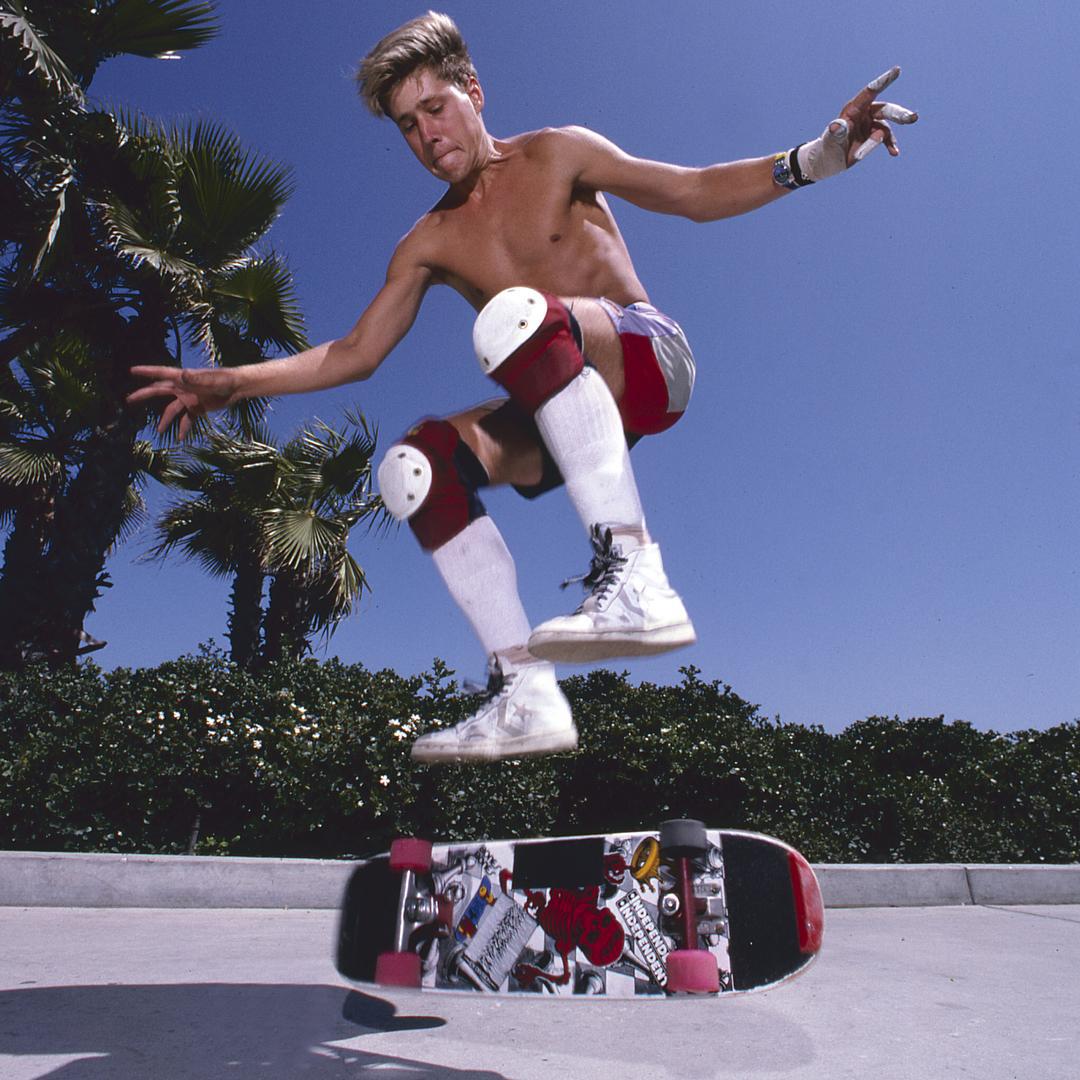
As a kid, I grew up on a farm in Florida, and I did what most little kids do. I played a little baseball, did a few other things like that, but I always had the sense of being an outsider, and it wasn’t until I saw pictures in the magazines that a couple other guys skate, I thought, ‘Wow, that’s for me,’ you know?
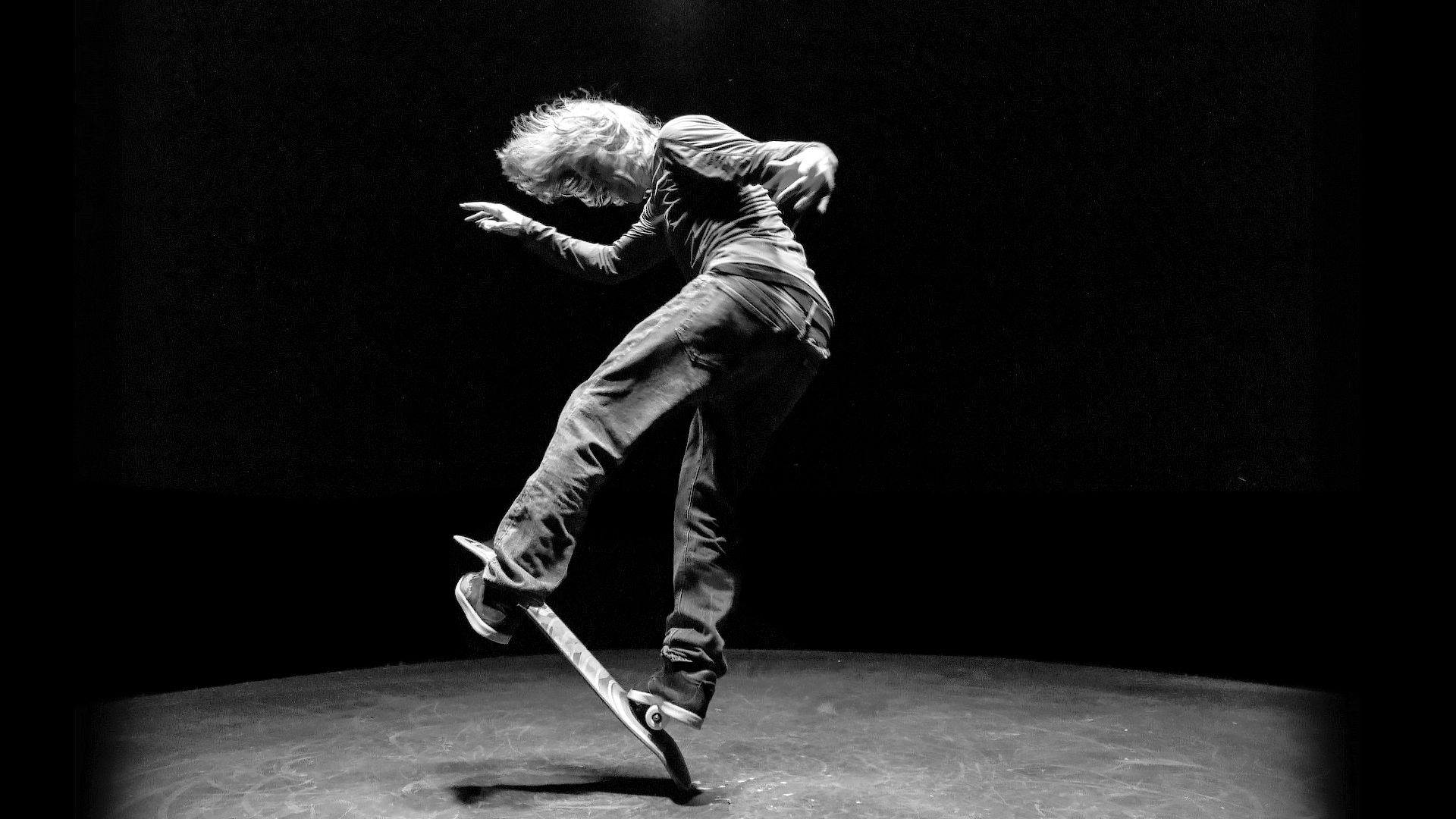
It wasn’t until ’79 I won my first amateur championship, and then, by ’81, I was 14, and I won my first world championship, which was amazing to me, and in a very real sense, that was the first real victory I had.
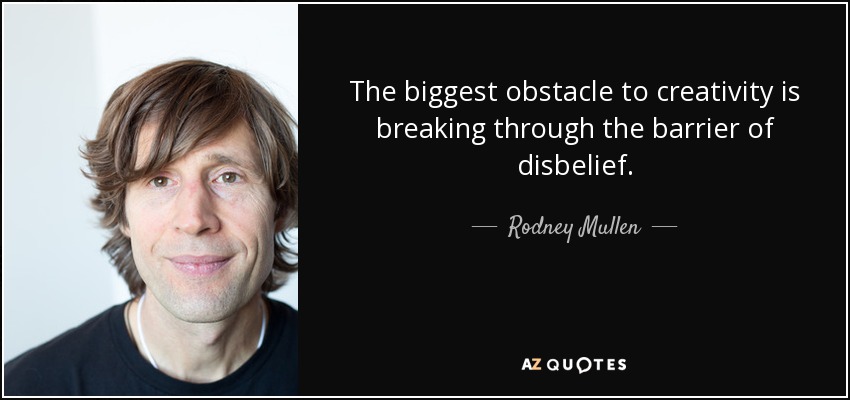
I like to study a lot of math, physics, and the Bible, too. For me, they all show that there’s a lot more to things than we see.
Vert skating was the kind of skating that was done in pools, where you could get airborne and be weightless. The other style, which is what I did, was called free style, which was tricks you could do on flat ground.
Skaters, I think they tend to be outsiders who seek a sense of belonging, but belonging on their own terms, and real respect is given by how much we take what other guys do, these basic tricks, 360 flips, we take that, we make it our own, and then we contribute back to the community the inner way that edifies the community itself.

Everyone expects me to do certain things,
What it is is that there’s an intrinsic value in creating something for the sake of creating it, and better than that … there is this beauty in dropping it into a community of your own making, and seeing it dispersed, and seeing younger, more talented, just different talent, take it to levels you can never imagine, because that lives on.
Any eyes on me – a late-night street sweeper, some dude texting in his parked car, the homeless guy talking to himself – make me feel uncomfortable when I skate. Everyone expects me to do certain things.
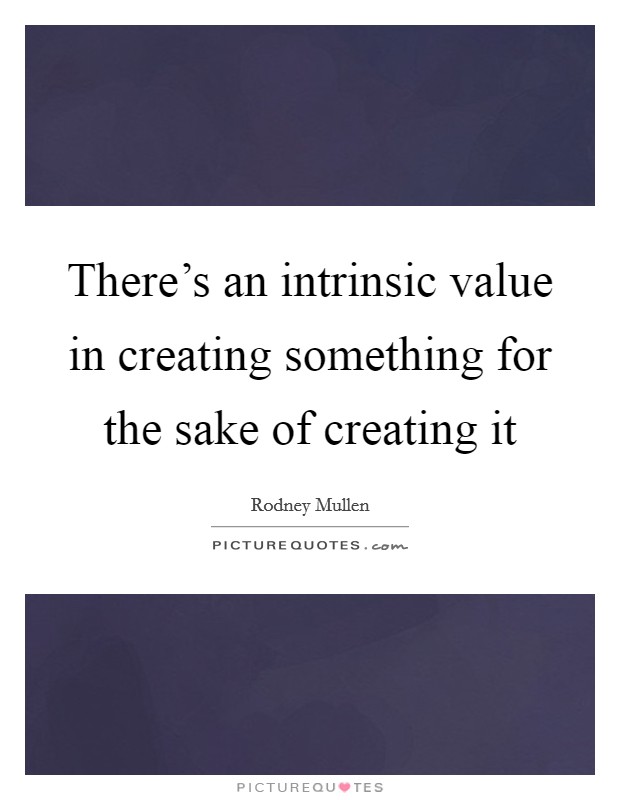
The degree to which we connect to a community is in proportion to our individuality.
It puts a ceiling on your progress. You’re blocked by your pride. To get good, you have to throw your board around and fall.
Who are you? What is your distinct contribution? That is so valuable whether it gets you anything or not. Trophies? Doesn’t matter. If you know you did it, that’s what keeps you going, you know? Success is illusive.
There’s an intrinsic value in creating something for the sake of creating it.
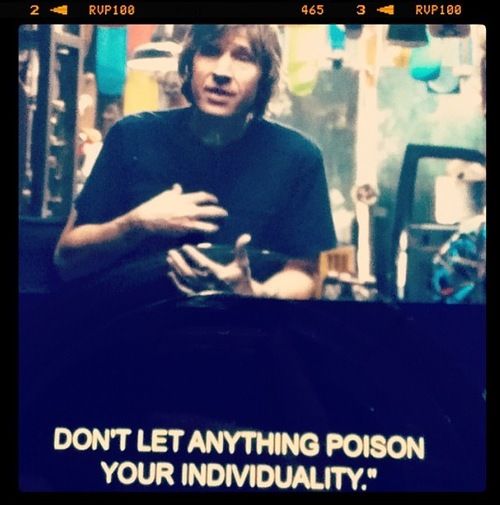
Even the world’s most successful individuals like Rodney Mullen have experienced their fair share of setbacks and hardships. And there’s much to learn from their challenges as well as their success.
Skateboarding is as much, or more, an art of mode of expression than it is a sport. What skateboarding has given me is precisely that: a form of expression that drew me to it, and, in so doing, I was able to express and be who I wanted to be through it, in a sense.
Do what you love and try not to look at what other people occupy themselves with. Most people seem restless and bounce around too much to focus or even pay attention enough to themselves to figure out exactly what they really do love, as opposed to what the people that surround them are doing.
I fell in love with skateboarding because it was individual; there were no teams, there were no captains, there was nothing to perfect. No style that had to be measured. It was completely opposite of what I saw in so many sports. It was creative. And to this day, that’s what I love, that’s always kept me back to it because it’s endless creation.
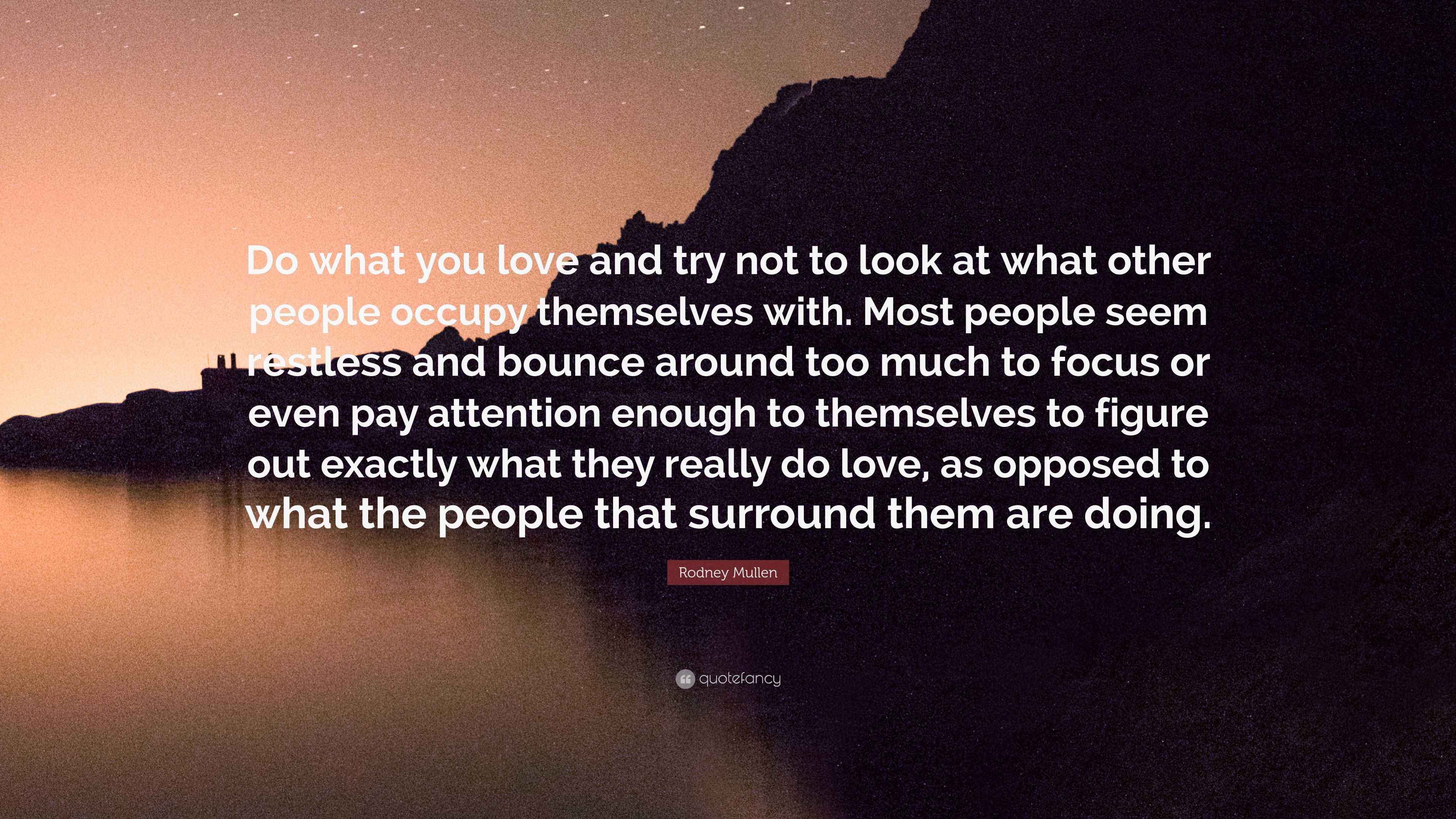
The biggest obstacle to creativity is breaking through the barrier of disbelief.
I fell in love with skateboarding because it was individual; there were no teams, there were no captains, there was nothing to perfect. No style that had to be measured. It was completely opposite of what I saw in so many sports. It was creative. And to this day, that’s what I love, that’s always kept me back to it because it’s endless creation.
Don’t let anything poison your individuality. Break away & look in, not outward.
Life throws curveballs. And while there might be blockers to success, it’s imperative to keep pushing with the knowledge mistakes will be made and failure is inevitable.
If you like our collection of famous quotes, don’t forget to share the article on Facebook, Pinterest and WhatsApp ?.

